Training

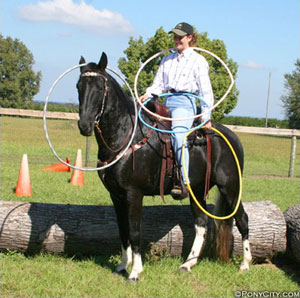
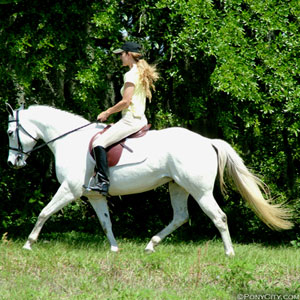
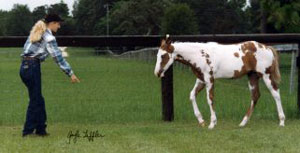
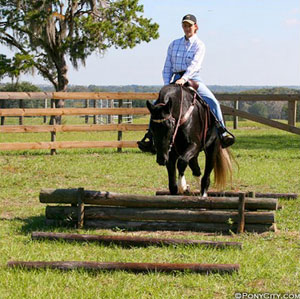
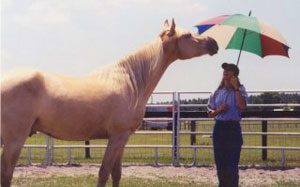
As natural horsemanship has become a better known way of being around horses, owners have come forward with dangerous or troubled horses or ones with annoying habits. Now that we have more information to better understand how a horse thinks, feels, acts, plays, perceives and associates, equine psychology has been taken to new levels. Natural horsemanship includes equine psychology and makes it easier to help people work through their issues by correcting years of bad habits. The great news is that many problems can be fixed within a few sessions and any dedicated horse owner can learn the basic principles themselves.
Horses are my passion. One of my goals in life is to see archaic and often cruel training methods of the past do just that--stay in the past where they belong. The way to do this is to educate people. Therefore, we must first realize our need for the right kind of education and then, want it. This is one of the most difficult areas of this business. There are so many trainers out there who feel content that they are winning and therefore, have nothing more to learn. And from a winning point of view, if that's all that is important to you, you might agree. What I'm asking folks to consider though, is the horse. There is nothing wrong with showing your horse but, if the training of it involves discomfort; physical or psychological, then there is something to be addressed. Notice I said discomfort, not pain. What is psychological discomfort? you might ask. How would you know if that was the case? Well, there are signs to read just like anything else but, again, one must be educated in what to notice and interpret correctly. I see people noticing certain behaviors, whether they be obvious or more subtle but, unfortunately, the interpretation is incorrect, therefore the solution chosen is the incorrect one resulting in a confused and often times more scared horse. Trust is then lost. Whatever forward steps were taken, have now gone backward and the negative relationship begins.
This is where I am different and what makes such a HUGE difference in your relationship and ultimately success with your horse.
Natural horsemanship is a must for anyone dealing with horses. Whether you are an owner of one horse or a barn full, and especially if you train or breed them, NH is a proven way to coexist with horses most effectively. It's more important for trainers because they are usually the ones passing on information to students and our younger generation. Let's pass on the best education we possibly can. That means we must seek and obtain the best education we possibly can. That also means that we must be the most open-minded of anyone.
I hold clinics dealing with various horse related issues. It is just as important to train the owner as well as the horse. Many people have said to me that they are not a "horse trainer" but, in essence, if they work with a horse, yes, even touch it, then they certainly are training the horse. Horses are always learning from the handler whether it is positive or negative, useful or unwanted. It is for this reason that owners MUST learn how to properly read, interpret and handle their horses naturally. Despite sometimes popular belief, it does not have to take that long!
Your horse does not need to have problems to benefit from this way of training. Think of it as learning to communicate with horses from their prey animal point of view. Several trainers all around the country are offering this type of training. Numerous horses have easily correctable problems. Often their sad fate is to be shuffled from one owner to the next, exacerbating their problems. Natural horsemanship can help them stay in their forever home.
Horses are my passion. One of my goals in life is to see archaic and often cruel training methods of the past do just that--stay in the past where they belong. The way to do this is to educate people. Therefore, we must first realize our need for the right kind of education and then, want it. This is one of the most difficult areas of this business. There are so many trainers out there who feel content that they are winning and therefore, have nothing more to learn. And from a winning point of view, if that's all that is important to you, you might agree. What I'm asking folks to consider though, is the horse. There is nothing wrong with showing your horse but, if the training of it involves discomfort; physical or psychological, then there is something to be addressed. Notice I said discomfort, not pain. What is psychological discomfort? you might ask. How would you know if that was the case? Well, there are signs to read just like anything else but, again, one must be educated in what to notice and interpret correctly. I see people noticing certain behaviors, whether they be obvious or more subtle but, unfortunately, the interpretation is incorrect, therefore the solution chosen is the incorrect one resulting in a confused and often times more scared horse. Trust is then lost. Whatever forward steps were taken, have now gone backward and the negative relationship begins.
This is where I am different and what makes such a HUGE difference in your relationship and ultimately success with your horse.
Natural horsemanship is a must for anyone dealing with horses. Whether you are an owner of one horse or a barn full, and especially if you train or breed them, NH is a proven way to coexist with horses most effectively. It's more important for trainers because they are usually the ones passing on information to students and our younger generation. Let's pass on the best education we possibly can. That means we must seek and obtain the best education we possibly can. That also means that we must be the most open-minded of anyone.
I hold clinics dealing with various horse related issues. It is just as important to train the owner as well as the horse. Many people have said to me that they are not a "horse trainer" but, in essence, if they work with a horse, yes, even touch it, then they certainly are training the horse. Horses are always learning from the handler whether it is positive or negative, useful or unwanted. It is for this reason that owners MUST learn how to properly read, interpret and handle their horses naturally. Despite sometimes popular belief, it does not have to take that long!
Your horse does not need to have problems to benefit from this way of training. Think of it as learning to communicate with horses from their prey animal point of view. Several trainers all around the country are offering this type of training. Numerous horses have easily correctable problems. Often their sad fate is to be shuffled from one owner to the next, exacerbating their problems. Natural horsemanship can help them stay in their forever home.
The perfect horse you are looking for is already in the one you own! All we have to do is educate ourselves and learn how to bring it out!
*Note: There are some cases where because of a horse's issues, they simply do not match well with the owner's present level of abilities and experience. Although painful, the reality may be to find such a horse a more experienced home that can help him through his issues and choose a horse, with experienced help, that better matches your present level of abilities.
I make this invitation:
PLEASE feel free to contact me by email at marciemorey@gmail.com OR call (352) 308-6996
For more information on the following services, please contact us:
- Private Sessions
- Phone consultations
- Video Consultations
- Group Sessions
- Gaited Horse Training
- Clinics at your facility
